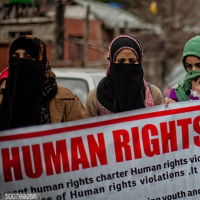India’s Human Rights Record among Concerns Expressed by U.S. Lawmakers in Advance of Prime Minister’s Visit
 Human rights demonstration in Srinagar, 2015 (photo: Yawar Nazir, Getty Images)
Human rights demonstration in Srinagar, 2015 (photo: Yawar Nazir, Getty Images)
By Matthew Pennington, Associated Press
WASHINGTON (AP) — U.S. lawmakers said Tuesday they are encouraged by growing defense cooperation with India but remain concerned about religious intolerance and slavery in the South Asian nation ahead of a visit by its prime minister.
The Senate Foreign Relations Committee examined ties between the world's two largest democracies in advance of Prime Minister Narendra Modi's address to Congress.
There is strong support among U.S. lawmakers for deeper relations with India, but plenty of grumbles about limited progress in boosting trade and investment and New Delhi's reluctance to accept U.S. scrutiny of its human rights record.
Some in Congress also expressed unease about India's ties with Iran after Modi this week visited Tehran and India agreed to invest $500 million to develop a strategic port in Iran.
Chairman Bob Corker, R-Tenn., said it was essential that the U.S. and India stand together to uphold democratic values and norms in the Indo-Pacific region as China seeks to gain greater influence.
He complained about high tariffs and red tape hindering U.S. access to the Indian market. Corker also expressed incredulity that about half of the estimated 27 million people in slavery in the world reside in India.
"How does a country like this have 12 to 14 million slaves in the year 2016. How does that happen?" Corker said.
Assistant Secretary of State Nisha Biswal, the top U.S. diplomat for South Asia, said that bilateral relations have "never been stronger" but said both sides recognize "there is much more to be done."
On slavery, she said there's increasing awareness and commitment in India to address the matter, and the U.S. ambassador on combating human trafficking had been allowed to visit the country for the first time and had "useful and constructive discussions."
Biswal said some human trafficking rings have been broken up, but India needs to "advance the rule of law across all aspects of its society to insure that these kinds of conditions don't exist, and this kind of trafficking does not exist."
Democratic Sen. Tim Kaine raised India's refusing visas in March to the U.S. Commission on International Religious Freedom, which issues an annual, global report. India's position is that the commission, which provides policy advice to Congress and the U.S. executive, does not have the legal standing to pass judgment on conditions in the country.
Kaine said India's status as a secular democracy could only be sustained "if people don't feel like they are going to be preferred or punished for how they choose to worship."
Relations between India and the United States have improved since Modi took office nearly two years ago, although he has struggled to enact economic reforms that Washington is keen to see. Modi is due to meet President Barack Obama at the White House on June 7, and then address a joint session of Congress the next day.
- Top Stories
- Controversies
- Where is the Money Going?
- India and the World
- Appointments and Resignations
- Unusual News
- Latest News
- India College Chain’s Expansion into U.S. Draws Opposition from Massachusetts Officials over Quality of Education
- Milk Shortages in India Tied to Release of New Movies Featuring Nation’s Favorite Stars
- Confusion Swirls around Kashmir Newspaper Ban in Wake of Violent Street Protests
- Polio-Free for 5 Years, India Launches Vaccine Drive after Polio Strain Discovery
- New Aviation Policy Could Increase Service, Lower Ticket Prices






Comments